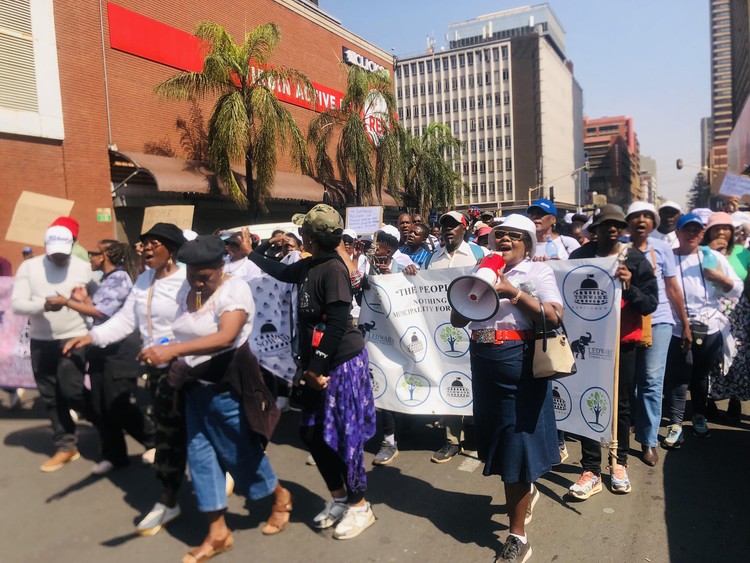
29 August 2024
Residents of several townships and informal settlements marched to the mayor’s office on Thursday. Photos: Silver Sibiya
Hundreds of residents from townships and informal settlements across Tshwane marched to the city centre on Thursday to hand over a memorandum of demands to the City of Tshwane executive management.
They were marching under the umbrella of the Laudium, Atteridgeville, and Saulsville Civics Association (LASCA).
The march took place on the same day Mayor Cilliers Brink was to face a motion of no confidence in the council sitting.
They called for an end to what they say is inaccurate billing for services, for the scrapping of historic debt, and for improvements in water delivery and rubbish collection.
LASCA leader Tshepo Mahlangu said Brink was holding back a report on debt write-offs.
“We just want to say to them, please accommodate our motion to write off our debts,” said Mahlangu.
“We want service delivery, especially in townships. We still don’t have water in some areas in Mamelodi, and there is no reliable electricity. We don’t have service delivery in Tshwane.”
Residents also demanded clean water and better rubbish collection.
Ikageng community leader Fransina Masala said they had had no water for five years in her area. “Even at night the water taps are dry.” She said old people have to use wheelbarrows to fetch water from water tankers.
Representing residents of Soshanguve, Maggie Sindane said some homeowners were being billed more than once for rates and services.
“You find pensioners being billed twice. When they go to municipality offices they are demanded 10% of whatever they owe. Sometimes it can be R60,000, where will they find such money?” she asked.
“We just want all of this to end so we can have a normal life.”
Willie Venter from the Office of the Mayor accepted the memorandum.
City of Tshwane spokesperson Lindela Mashigo said the City will implement a water plan in four phases in Hammanskraal, starting in October and the last phase in June 2025.
“This means that the City we will be able to finalise the replacement of dysfunctional meters and install new meters to areas, within Hammanskraal, that do not have meters, accelerate the registration of the indigent cohort, and embark on a billing outreach programme.”
He said waste collection and disposal delays were caused by service providers “grappling with the routes which escalated to threats and acts of violence against the waste trucks along certain routes and at landfill sites”.